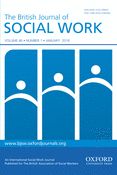-
Views
-
Cite
Cite
Nehami Baum, Work–Family Conflict among Social Workers, Managers and Policy Makers in Times of Disaster, The British Journal of Social Work, Volume 46, Issue 1, January 2016, Pages 222–238, https://doi.org/10.1093/bjsw/bcu094
Close - Share Icon Share
Abstract
Fifty Israeli social workers at three hierarchical levels (direct service providers, agency or regional managers, policy makers) were interviewed about their experience of work–family conflict during wartime when the communities where they lived and most of them worked came under attack. The findings provide evidence of intensified work–family conflict throughout, but also show that the experience of the conflict varied with the workers' hierarchical level and gender. The direct service workers of both genders were torn between their family and job responsibilities. Male and female managers differed in their attitudes and conduct towards workers who absented themselves the first few days of the war so as to make child-care arrangements. Male and female policy makers differed in their assessments of the ability to resolve the conflict at a systemic level. Suggestions are made for planning the delivery of social work services in disasters with the work–family conflict in mind.




